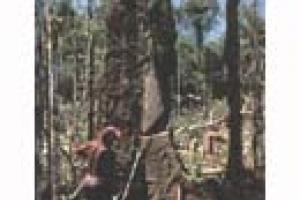Only available in Spanish
Publicación de Censat-Agua Viva en ocasión de la Cumbre Mundial de Johannesburgo.
Amazonía: Selva y Bosques diez años después de Río
Peru
Bulletin articles
14 June 2002
Many Latin American governments, in order to obtain income and satisfy the conditions of the IMF structural adjustment programmes, and supported by World Bank loans, have placed the natural resources of their country at the disposal of multinational companies, and grant concessions to those, who at any cost, wish to perpetuate the exploitation model to their own benefit. Many Latin American peoples have also understood that if they get organised they can defend their lands, their forests and their very survival.
Bulletin articles
15 March 2002
Within the ecological region of the Andean Belt, the Vilcabamba Cordillera in Peru is the only part where the original habitat has not been degraded. Together with the Urubamba Valley, they constitute a region where so far biodiversity has been conserved in an almost pristine state. Furthermore, it is a zone that fulfils important ecological processes --for the water system and climate change, among others-- essential both to the region and to the world in general.
Other information
21 December 2001
Although the President has changed in Perú, the forest degradation process and the indigenous peoples' situation remains the same or even worse. As was denounced several times in previous issues of this bulletin (1, 8, 34 and 35), the Peruvian Amazon forest is being degraded by activities such as oil prospection and extraction and logging by powerful Malaysian companies. Illegal logging also adds a new menace to the material and cultural survival of the indigenous groups that live in the forest.
Bulletin articles
11 August 2001
The farmers and peasants from the valleys of Tambogrande, San Lorenzo and the Locuto and Nacho Távera communities in the Department of Piura have received a hard blow with the announcement made by Alejandro Toledo’s Prime Minister that the country is to become a leading mining country. This does not consider the decision of the populations settled in the area for hundreds of years.
Other information
8 August 2001
The indigenous Shawi people repeat their call for protests in defense of their territory in the tropical rainforest. This time the threat is in the form of the world's leading gold mining company: Barrick Gold Corporation.
Bulletin articles
13 February 2001
The spill of 5,500 barrels of oil at the Marañón River that occurred on October 3rd 2000 in the heart of the Peruvian Amazon, at Urarinas and Parinari Districts in the Province of Loreto, constitutes an ecological disaster, whose consequences are still provoking damages to the environment and to the indigenous population of the area. The spill affected the Pacaya Samiria Reserve, which is the biggest protected area in the country. Responsible for both the accident and the present situation is the transnational Pluspetrol based in Argentina.
Bulletin articles
18 June 2000
During the past months, Peru has occupied the international news headlines because of the political and institutional deterioration that is affecting the country. In line with such situation, the Peruvian Amazon forest continues to deteriorate. Oil prospection and extraction (see WRM Bulletins 1 and 8) and logging by powerful Malaysian companies (see WRM Bulletin 34) are two main causes of such degradation. The depredatory activities of local loggers, as well as illegal coca cultivation aimed at supplying the international cocaine market, further add to the problem.
Bulletin articles
18 May 2000
Malaysian logging companies have recently expanded to a large number of Southern countries. Even if Malaysian authorities have publicly urged their home-based companies to operate within the law and to be sensitive to environmental issues in their activities abroad, this expansion -that has been promoted by the government itself- has proved detrimental to the people and the forests in host countries' remaining rainforests. Countries in different continents, like Papua New Guinea, Brazil, Guyana, Belize, Cameroon and Cambodia have witnessed the way these companies work.
Bulletin articles
20 January 2000
The Mashco Piro, Yora, Amahuaca, and Yaminahua indigenous peoples in the amazonic Alta Piedras region of Madre de Dios in Peru, are being threatened by pending forest concessions. These peoples -called "uncontacted"- which have chosen to remain in isolation from Peruvian society, would have their way of life, as well as their natural resources severely impacted if logging in their ancestral lands actually takes place.
Bulletin articles
2 January 1998
Rainforest Action Network (RAN), Amazon Watch and Project Underground remain deeply concerned about Shell's activities in the Peruvian Amazon and have decided not to participate in the workshops organized by the company to discuss the Camisea Project that took place in Washington DC on December 12 and in London on December 15.
Bulletin articles
7 May 1997
Shell Oil has plans to start drilling for natural gas this July in a rainforest area that Peru's government set aside as a homeland for so-called "uncontacted" indigenous people, inhabited by the Nahua and Kugakopori in the Urubamba River valley, a biodiversity rich area.
Even if - to avoid any possible charges of environmental damage- Shell has vowed to refrain from causing any negative environmental impact, some charges of environmental damage, like alteration of the water and problems in hunting and fishing have already begun to come in.
Pagination
- First page
- Previous page
- 1
- 2
- 3
- 4
- 5
- 6
- 7

